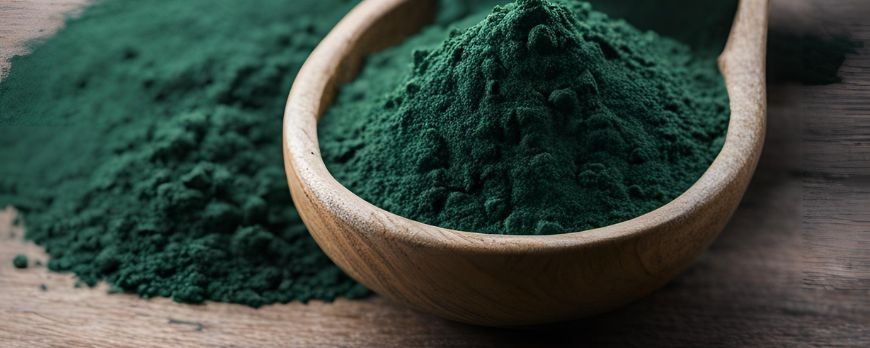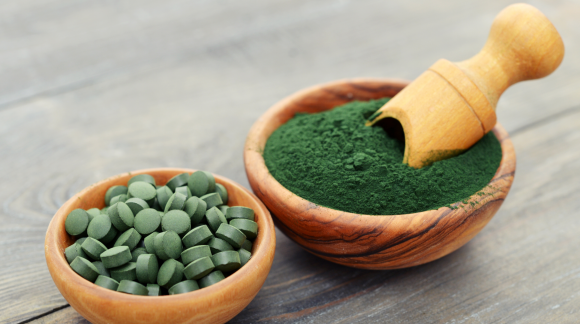Spirulina: Origin, Virtues and Use - The 2025 Guide
Spirulina: Complete Guide 2025 - Origin, Benefits and Use
For several decades, spirulina has been attracting attention for its nutritional properties and health benefits. Classified among superfoods, this blue-green cyanobacteria is considered a natural source of essential micronutrients. But where does it come from? How is it produced? What are its real benefits? Here is a complete guide to know everything about spirulina.
1. Spirulina: Origin, Production and Manufacturing
1.1 What is spirulina ?
Spirulina is a microscopic cyanobacterium that has existed for over 3.5 billion years. Unlike algae, it does not grow in the sea, but in nutrient-rich alkaline waters. This photosynthetic bacterium is capable of converting solar energy into nutrients, making it a concentrated source of vitamins, minerals, and proteins.
Consumed since antiquity by the Aztecs and some African populations living around Lake Chad, spirulina has regained popularity in recent decades due to its numerous health benefits. NASA and the European Space Agency have also studied it for its potential as a sustainable food for space missions.
1.2 Where is spirulina found in the world ?
In its natural state, spirulina is found in warm alkaline lakes located in Africa, South America, and Asia. Today, it is industrially cultivated in China, India, and the United States, which are the main global producers.
In Europe, and more specifically in Switzerland and France, there are small artisanal farms that produce high-quality spirulina, dried at low temperatures to preserve its nutrients. These producers favor environmentally friendly methods, without chemical fertilizers or pesticides.
1.3 How is spirulina made ?
The spirulina production process includes several essential steps:
- Cultivation in alkaline water basins under optimal sunlight or in a greenhouse.
- Harvest by filtration to extract biomass.
- Drying at low temperature (less than 42°C) to preserve nutrients.
- Transformation into powder, flakes or tablets.
2. The Benefits of Spirulina: What Science Says
2.1 A natural support for immunity
Thanks to its richness in antioxidants and phycocyanin, spirulina stimulates the immune system by activating the production of antibodies and the response of white blood cells. It also helps to reduce chronic inflammation and improve resistance to infections. Several scientific studies have demonstrated its positive role in strengthening the immune system, particularly in people prone to frequent infections. By acting on the intestinal flora, it also promotes the production of good bacteria that participate in the body's defense.
2.2 A powerful antioxidant and anti-inflammatory
Spirulina contains beta-carotene, vitamin E, and polyphenols that help combat free radicals responsible for cellular aging. Its exceptional concentration of phycocyanin gives it powerful anti-inflammatory properties, thus helping to reduce joint and muscle pain. Its action is particularly beneficial for athletes, who undergo significant oxidative stress after exertion. By regulating pro-inflammatory cytokines, it also plays a role in the prevention of chronic inflammatory diseases.
2.3 Detoxification and liver support
Thanks to its unique structure, spirulina helps the body eliminate toxins and heavy metals, such as lead and mercury. It also supports the liver by stimulating the hepatic enzymes involved in natural detoxification. In addition to a balanced diet, it can be an excellent ally for improving digestive health and promoting optimal metabolism.
2.4 Contribution of bioavailable iron
Contrary to popular belief, spirulina is an interesting source of iron but cannot replace iron intake from a variety of foods. It is particularly beneficial for vegetarians and women with iron deficiencies, especially when paired with vitamin C for better absorption. This highly bioavailable iron helps combat fatigue and anemia, while supporting physical and intellectual performance.
2.5 Improvement of physical performance
Athletes and sports enthusiasts use spirulina for its effect on endurance and muscle recovery. It allows for better oxygenation of cells, reduces pain after exercise, and optimizes energy production. Moreover, its richness in essential amino acids contributes to muscle rebuilding after intense effort.
2.6 Cardiovascular Support and Cholesterol Regulation
Studies have shown that spirulina can play a role in reducing levels of bad cholesterol (LDL) and increasing good cholesterol (HDL). Thus, it contributes to improving cardiovascular health by reducing the risks of heart disease and optimizing blood circulation.
FAQ: Your Frequently Asked Questions
- Does spirulina have any contraindications ?
Yes, it is not recommended for people suffering from phenylketonuria and people on anticoagulant treatment. It may also contain traces of iodine, which can pose a problem in cases of hyperthyroidism. - What is the best way to consume spirulina ?
It can be taken in powder, tablet, or flake form. For better absorption, it is recommended to consume it with a source of vitamin C. - Is spirulina suitable for pregnant women ?
Yes, provided you choose a high-quality spirulina, free of contaminants, and respect the recommended doses. - Can spirulina help with weight loss ?
She can support weight loss by reducing the sensation of hunger and promoting nutritional balance, but she does not replace a balanced diet. - How long does it take to observe its effects ?
The effects vary from person to person, but benefits can be felt after a few weeks of regular use. - Is spirulina compatible with all diets ?
Yes, it is suitable for vegetarian, vegan and gluten-free diets. - Why choose organic spirulina ?
Organic spirulina guarantees a culture without pesticides or heavy metals, thus preserving all its nutritional properties.
Our BN Nutrition Spirulina: Quality and Purity at the Meeting
A premium spirulina from a controlled culture
At BN Nutrition, we have selected an exceptional organic spirulina, grown in a preserved environment, without pesticides or heavy metals. Thanks to low-temperature drying, it retains all its nutrients and active ingredients. Its mild taste and fine texture make it an ideal spirulina for daily consumption, whether in powder, tablet, or flake form.
A natural supplement for energy and well-being
Our spirulina is an essential ally to boost your vitality, strengthen your immune system and optimize your recovery after effort. Thanks to its richness in phycocyanin, iron, vitamins and antioxidants, it fits perfectly into a healthy and active lifestyle.
Discover the quality of BN Nutrition and give your body the best that nature has to offer.
References:
- Karkos, P. D., et al. "Spirulina in Clinical Practice: Evidence-Based Human Applications." Nutrition Research Reviews, 2011.
- Fukino, H., et al. "Effect of Spirulina on the Renal Toxicity Induced by Inorganic Mercury and Cisplatin." Eisei Kagaku, 1990.
- Belay, A. "The Potential Application of Spirulina (Arthrospira) as a Nutritional and Therapeutic Supplement in Health Management." Journal of the American Nutraceutical Association, 2002.






